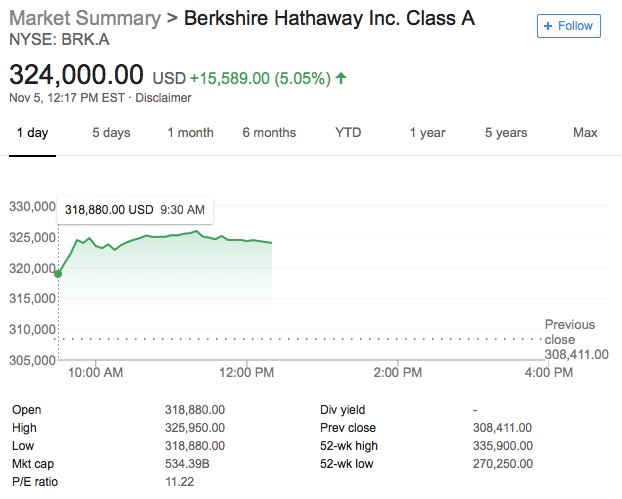As quarterly profits double for Warren Buffett’s Berkshire Hathaway conglomerate, the legendary investor moves to buy back over $900 million in shares in one of the first signs of vindication for bulls who say the run it’s over.
Buffett thanks Trump’s December 2017 tax cuts and lower-than-expected losses in Berkshire’s insurance business for what turned out to be a Q3 2018 operating profit of $6.88 billion—up from $3.44 billion a year ago.
That also beat Wall Street analyst expectations of $6.11 billion in operating profit.
Buffett’s $928-million buyback is his first since 2012. But, as always, there are multiple interpretations.
From the bulls’ perspective, this means that Buffett sees a lot of investment opportunities right now for Berkshire Hathaway—nearly a billion dollars in opportunities, to be exact. And as the Wall Street Journal points out, Buffett likes big investments that aren’t overvalued.
Things are cheap, and Berkshire hasn’t made a big acquisition since 2016, when it bought Precision Castparts Corp. for some $32 billion—though it did boost its shares in Apple in the first part of the year to nearly $47 billion, and then to nearly $58 billion most recently.
But another interpretation is less optimistic, and holds that the billion-dollar share buyback indicates that Buffett doesn’t see anything else worth investing in other than Berkshire right now.
Yet a third interpretation is that Buffett simply thinks that the market is undervaluing Berkshire shares.
And that’s where the quarterly profits come in, described to Reuters by Bill Smead, chief executive of Berkshire shareholder Smead Capital Management in Seattle, as “one of the biggest quarterly earnings reports that has ever come out of a United States corporation”.
While the previous year saw Berkshire take massive losses over three hurricanes in the United States and an earthquake in Mexico, this year, Mother Nature was kinder. While last year’s insurance losses reached $1.4 billion, Q3 2018 insurance underwriting income was $441 million.
Q3 net income for Berkshire rose more than 355 percent, to $18.5 billion. Related: Would You Take A Pay Cut For More Time Off?
Tax reform also helped, rendering Berkshire’s effective Q3 tax rate 19.2 percent, down from 25.3 percent a year ago.
Berkshire’s stock looked like this in afternoon trading:

(Click to enlarge)
The bulls may be hopeful that Buffet’s buyback is a signal of better things to come, the billion-dollar move has failed, so far, to boost the Dow.
But with mid-terms weighing on speculative moves, it’s hard to tell what effect the Berkshire buyback is having.
Overall, though, some analysts have been basing a market rebound on the prospect up a new round of big buybacks.
Following suit after Buffett’s move, Spotify on Monday also announced plans for a $1-billion share buyback this quarter.
Royal Dutch Shell—whose profits are also soaring—has accelerated its massive $25-billion share buyback program. Chevron is also heavy into buybacks, but it’s peer, Exxon Mobil, isn’t doing the same, despite its biggest Q3 profit in years.
Not everyone agrees that buybacks will save the market.
Speaking to MarketWatch, INTL FCStone global market strategist Vincent Deluard said buybacks are poised to be 30 percent less than they were in Q2, and are likely to continue slowing going forward.
By Tom Kool for Safehaven.com
More Top Reads From Safehaven.com:
















